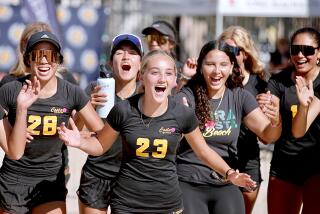BEACH VOLLEYBALL AT HERMOSA BEACH : They Have Found Some Money Out in the Sand
- Share via
Sinjin Smith played for little more than a hearty handshake and a cold beer when he started on the professional beach volleyball tour in 1977.
But much has changed, what with TV contracts, increased purses and admission charges for courtside seats.
And some players, Smith among them, say the sport is drifting away from its California beach roots.
“I had no idea I would be making this kind of money when I started,” said Smith, who has won 124 tournaments, more than any other player. “The sport’s definitely changing at this level.”
Pro beach volleyball has grown from its humble beginnings, when players traveled together in vans to tournaments from Santa Cruz to San Diego and played for little, if any, prize money.
“There were only 10 stops, all in California,” Smith said. “The entire purse was only about $5,000.”
The tour, which became the Assn. of Volleyball Professionals in 1983, has 25 stops, stretching from the $750,000 Miller Lite U.S. Championships at Hermosa Beach today and Saturday, to Cape Cod, Mass.
Prize money this season exceeds $2.5 million, including a $500,000 bonus pool that will be awarded at Hermosa Beach. Smith and Stoklos could pass the $1-million mark in career earnings this weekend.
But prize money aside, Smith said that some of the recent changes and growth have hurt the sport.
At the heart of the discussion is the AVP’s multiyear TV contract with NBC. The tour has set a 42-minute time clock for the three championship matches televised live by NBC this season, including the Hermosa Beach tournament.
All preliminary matches are played under an eight-minute time clock to 15 points. The time clock runs only when the ball is in play.
“We’ve gone away from our roots,” Stoklos said. “But you have to in any pro sport because of TV. I’m not saying TV controls all sports, but we have to bend over backward for it because of the dollars.”
Smith and Stoklos, defending champions at Hermosa Beach, said they don’t like the time limits.
“They’re shortening the game too much,” Smith said. “NBC wants it live, and it’s risky because we want to put on a good show. If we don’t fill the time slot with good volleyball, then (network executives) won’t think it’s a worthwhile sport to televise.”
But Smith said time restraints detract from the excitement. Some finals have lasted as long as 80 or 90 minutes, testing a player’s physical and mental toughness.
“The best games are the ones that go deuce in the end,” Smith said. “Those are the matches people remember.
“Prime Ticket televises our matches tape-delay and lets us have as much time as we want. NBC should tape-delay it, too, like a half a day or something.”
Smith and Stoklos were so adamant about the time-clock change that they refused to take the court for a final at Grand Haven, Mich., in July.
They sat out for more than an hour, protesting the rule, but finally took the court and lost to Karch Kiraly of San Clemente and Kent Steffes of Pacific Palisades.
Jon Stevenson, AVP president and a player on the tour, said the first NBC telecast--the Milwaukee Open four weeks ago--drew 15 million viewers.
“It guarantees some very big numbers for us,” he said. “The deal couldn’t be better. It’s a test for our sport, to see how it appeals to the U.S. sports fan.”
Stevenson said the tour also will be charging for the 6,000 main-court bleacher seats as early as next year. Sites such as the Fresno Open have already charged for box seats at main court.
But the sport’s increasing popularity has tour officials concerned about crowd control, and one way to handle it is by charging admission. Stops at Manhattan Beach, Seal Beach and Hermosa Beach regularly draw more than 30,000 people over two days.
Stevenson said some sites will have admission gates as early as next summer.
“It’ll be a nominal fee,” he said. “Something like $5. There’s no real profit incentive there.”
Beach Volleyball Notes
Competition starts at 9 a.m. today and 8 a.m. Saturday. The final is scheduled for 2 p.m. Saturday and will be televised live by NBC. . . . Steve Timmons of Manhattan Beach, a two-time Olympic gold-medal winner, will miss the tournament because of a nagging shoulder injury.
More to Read
Go beyond the scoreboard
Get the latest on L.A.'s teams in the daily Sports Report newsletter.
You may occasionally receive promotional content from the Los Angeles Times.










